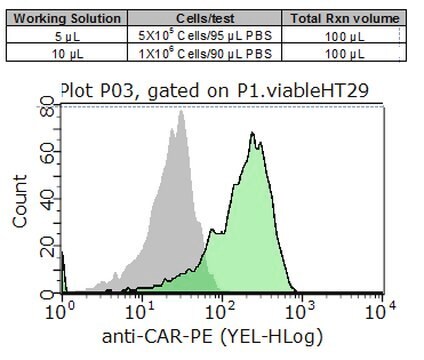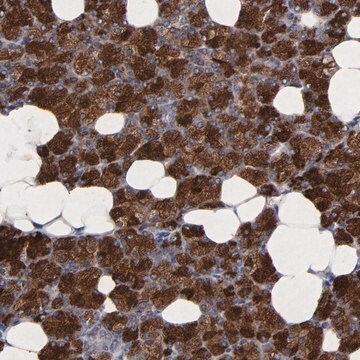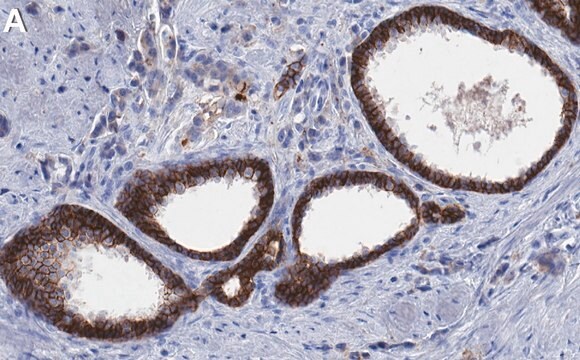05-644
Anti-CAR Antibody, clone RmcB
clone RmcB, Upstate®, from mouse
Synonyme(s) :
46 kD coxsackievirus and adenovirus receptor (CAR) protein, CVB3 binding protein, CVB3-binding protein, Coxsackievirus B-adenovirus receptor, coxsackie virus B receptor, coxsackie virus and adenovirus receptor
About This Item
Produits recommandés
Source biologique
mouse
Niveau de qualité
Forme d'anticorps
purified immunoglobulin
Type de produit anticorps
primary antibodies
Clone
RmcB, monoclonal
Espèces réactives
human, rat, mouse
Fabricant/nom de marque
Upstate®
Technique(s)
immunocytochemistry: suitable
western blot: suitable
Isotype
IgG1
Numéro d'accès NCBI
Numéro d'accès UniProt
Conditions d'expédition
wet ice
Modification post-traductionnelle de la cible
unmodified
Informations sur le gène
human ... CXADR(1525)
Description générale
Spécificité
Immunogène
Application
1-2 μg/mL of a previous lot showed positive immunostaining for CAR in HeLa cells, hCAR transfected CHO cells, but not in untransfected CHO cells fixed with 4% paraformaldehyde and permeabilized with 0.2% Triton-X.
Qualité
Western Blot Analysis:
1:500 dilution of this antibody detected Car on 10 µg of mouse small intestine lysates.
Description de la cible
Forme physique
Autres remarques
Informations légales
Vous ne trouvez pas le bon produit ?
Essayez notre Outil de sélection de produits.
Code de la classe de stockage
10 - Combustible liquids
Classe de danger pour l'eau (WGK)
WGK 1
Certificats d'analyse (COA)
Recherchez un Certificats d'analyse (COA) en saisissant le numéro de lot du produit. Les numéros de lot figurent sur l'étiquette du produit après les mots "Lot" ou "Batch".
Déjà en possession de ce produit ?
Retrouvez la documentation relative aux produits que vous avez récemment achetés dans la Bibliothèque de documents.
Notre équipe de scientifiques dispose d'une expérience dans tous les secteurs de la recherche, notamment en sciences de la vie, science des matériaux, synthèse chimique, chromatographie, analyse et dans de nombreux autres domaines..
Contacter notre Service technique








